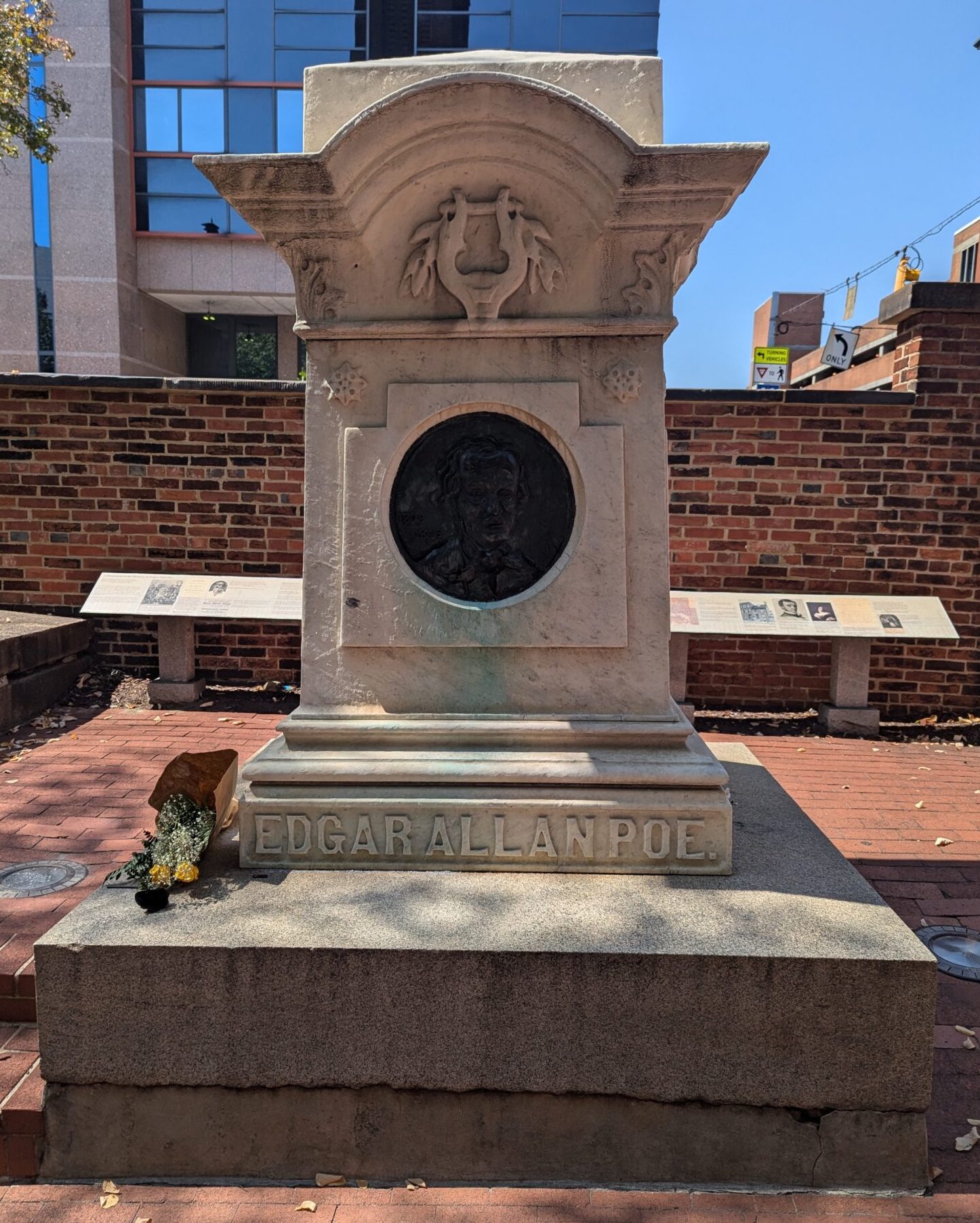Rooted in History: 175 Years Later, Mystery Still Shrouds Poe’s Death
March 10, 2025 Tara Wink
Learn how the sites of the famed author-poet’s death and burial are connected to UMB in the latest issue of “CATALYST” magazine.
This fall marked 175 years since author-poet Edgar Allan Poe’s mysterious death in Baltimore at Washington University Hospital. To this day, the reasons behind Poe’s visit to Baltimore, his whereabouts in the city, and the cause of his death continue to be researched and debated. While there are many mysteries and theories surrounding his death, his connection to the University of Maryland, Baltimore (UMB) is not one of them.
Poe was born in Boston while his parents were traveling, but his family was long established in Baltimore, where Poe lived for a few years with his aunt (and eventual mother-in-law) Maria Clemm until 1835, when he moved to Richmond, Va.
In the days leading up to his death, Poe arrived in Baltimore from Richmond on Sept. 28, 1849. Where Poe went, what he did, or who he was with over the next five days have never been determined. One theory suggests he fell victim to Election Day “cooping,” a 19th-century form of electoral fraud where poor and homeless individuals were gathered by gangs supporting one political candidate and forced to vote. Another theory suggests he was beaten or mugged. Still others believe he spent the five days drinking, as he was believed to be an alcoholic.
Poe was found Oct. 3 at a tavern by Joseph W. Walker, a Baltimore printer, who sent a note to Poe’s acquaintance, J.E. Snodgrass, MD 1836. The note read:
Dear Sir: There is a gentleman, rather the worse for wear, at Ryan’s 4th ward polls, who goes under the cognomen of Edgar A. Poe, and who appears in great distress, & he says he is acquainted with you, and I assure you, he is in need of immediate assistance.
Yours in haste, Jos. W. Walker.
Snodgrass tried to secure a private room in the tavern where Poe could rest and recover. Poe’s uncle, Henry Herring, convinced Snodgrass that Poe needed medical attention, and he was taken to Washington University Hospital on Broadway Street.
Washington Medical College was founded in 1827 by Horatio Gates Jameson, MD 1813, who was angered by his failure to acquire a faculty position at UMB. Initially, the state of Maryland declined to approve a charter for the school, so Jameson turned to Washington College in Pennsylvania, using its charter to start a medical school in Baltimore. In 1832, it was able to obtain a charter from the Maryland legislature and, in 1839, it changed its name to Washington University of Baltimore.
The school operated out of a building on North Holliday Street between Lexington and Saratoga streets. In 1838, the school needed a larger building complete with a hospital, so a new building opened on North Broadway Street. This new building included space for medical instruction and coursework, as well as hospital wards and rooms for 50 students. Poe lived out his final days in this building.
Washington University closed in 1852, and the hospital became the Church Home and Infirmary. After the Civil War, the school reopened under the leadership of Edward Warren, a former faculty member at the University of Maryland School of Medicine (UMSOM). It survived for an additional 10 years before merging with the College of Physicians and Surgeons (P&S) in 1877. In 1915, P&S merged with UMSOM; as a result, the histories of Washington University and P&S are tied to UMB.
When Poe arrived at the hospital, he came under the care of John J. Moran, MD 1845, resident physician at Washington University Hospital. Moran is partially responsible for the rumors and mysteries surrounding Poe’s death, as he published claims and went on speaking tours in the 1870s and 1880s that contradicted each other. Moran sought to boost his fame and fortune by capitalizing on the intrigue around Poe’s life and death.
However, the most accurate description of Poe’s final days comes from a letter from Moran to Maria Clemm. In the letter, Moran depicts a very sick man, describing periods where Poe spoke to “spectral and imaginary objects on the walls” and called for someone named “Reynolds.” Poe, according to Moran, also experienced tremors, bouts of unconsciousness, and delirium before his death. When questioned, Poe was unable to remember where he had spent his time in Baltimore or how he became so ill. In the early morning hours of Oct. 7, Moran described Poe as saying, “Lord help my poor Soul” before dying. The cause of Poe’s death was reported as “congestion of the brain.” If Poe’s medical records and death certificate existed, they have never been found.
Read more about Poe's death here.
You can read the Fall 2024 issue of CATALYST magazine, which highlights the School of Dentistry's efforts to provide dentures to seniors through a grant program; School of Pharmacy recent graduate Alena Abraham's podcast dedicated to supporting the blind and visually impaired community; Mary Maldarelli, a fellow in Pulmonary and Critical Care Medicine and 2019 School of Medicine graduate using her musical talents to create a therapeutic healing environment; Taofeek K. Owonikoko, MD, PhD, the new executive director of the University of Maryland Marlene and Stewart Greenebaum Comprehensive Cancer Center; and much, much more!